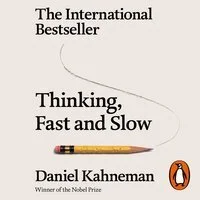Thinking, fast and slow
Thinking, fast and slow. A great book, and it extends even further and more personally than you may think!
All too often in our lives, we see information we may have seen before. This kicks up the "I know this already" reflex. If you know something, that is great. Personally, I believe there is only so much that you need to know before you need to do. Taking action is the application of knowing.
And as I'm sure you are saying to yourself, taking action is really the difficult part.
Although the funny thing that I have found is that the people great at taking action are usually worse in the "I know this already" department. A harmony is of course the ultimate. The right balance for you, coordinating all areas of your life and giving you that middle ground to help you be the best version of yourself.
Enough abstract for the moment. Real life? Let's apply the thinking slow principle.
When we lose or misplace things, we often start to move faster and panic/ stress kicks in. Maybe a little, maybe a lot. What do you do? What if you can't find your keys and you really need to go? What if people are calling your phone but it very may well be on silent?
1 - prepare for this eventuality. It is a certainty that you will misplace things at some point in time. But these techniques are for another day.
2 - techniques for the moment. The first thing to do is stop and calm your breathing. Breath into your belly, 4 counts in, 6 counts out, for about 5 repetitions before we take the next step. Maintain your breathing and close your eyes, where do you last remember having the object? See the memory, eliminate locations in your mind. Ask yourself where was your journey? Where did you travel from and to? Where along that way could you have dropped it or set it down? and perhaps who could you have given it to? Often people forget that they are holding what you are looking for.
The breathing helps our biology and allows us to continue accessing our brain.
The elimination process helps us feel like we are being successful and productive (lowering stress hormones and allowing us to think even clearer) and it also is the most mathematical/ logical way of working through the problem.
Often when people can calm themselves down enough to do this, they find what they need.
The real secret is that the brain is conditioned to believe that frantically searching for something is the best way to approach the problem.
Slow down the breathing, slow down the brain, allow more to be accessed. Stress acts like a vice on our thinking mind, the more stress, the less freedom we have. Thinking slowly is a muscle that we need to exercise regularly before we start behaving in this way automatically! Think slow first, exercise it, and gradually you will start doing it without realizing that you are doing it!
More to come on this topic, including a TED talk showing this exact effect, a podcast talking about this too, and a firefighter being smarter than a chess champion? What's that about? Let's discuss it together.
